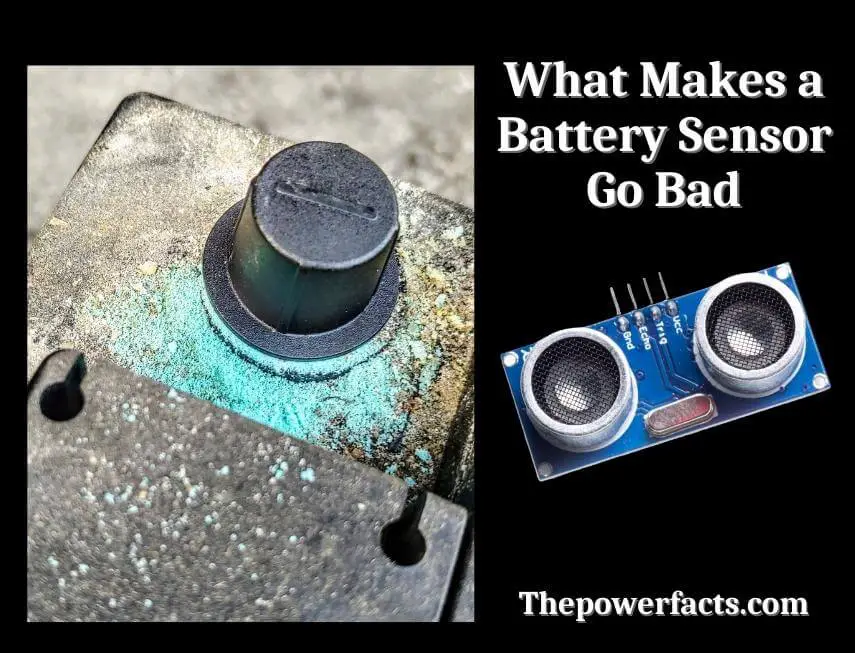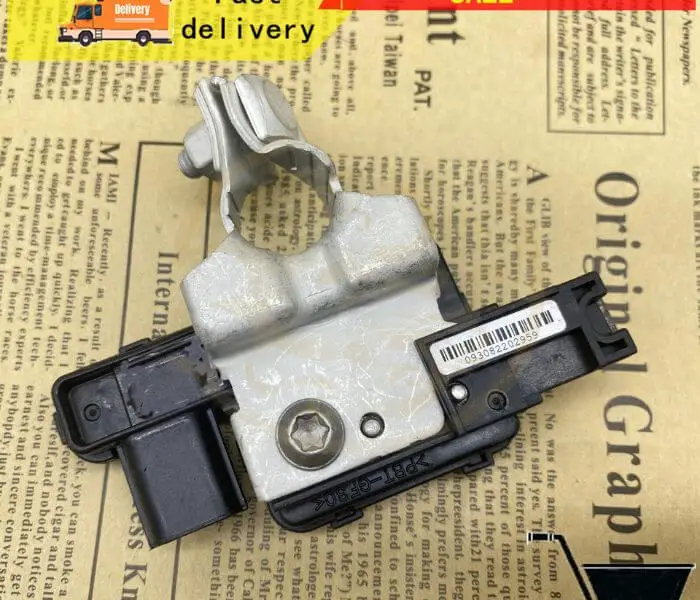As with any electronic device, there are a number of things that can go wrong with a battery sensor. The most common issues include corrosion, voltage fluctuations, and physical damage. Corrosion is one of the most common causes of battery sensor failure.

This can happen when the sensors are exposed to moisture or chemicals. Voltage fluctuations can also cause problems for battery sensors. These fluctuations can come from power surges or other electrical problems.
Finally, physical damage can occur if the sensors are dropped or otherwise damaged.
Many people don’t realize that their battery sensors can go bad. This is a small, but important, component in your car’s electrical system. The battery sensor monitors the voltage of your battery and sends a signal to the car’s computer when it gets too low.
If the sensor goes bad, it can cause all sorts of problems. The most common symptom of a bad battery sensor is dimming headlights. This happens because the computer thinks the battery is low and cuts back on power to the lights.
The headlights may also flicker or turn off completely while driving. Other symptoms include strange engine noises, stalling, and trouble starting the engine. If you suspect your battery sensor is going bad, take it to a mechanic or dealership for diagnosis.
They will be able to test the sensor and replace it if necessary.
What Causes a Battery Current Sensor to Go Bad?
A battery current sensor is an important part of any charging system. It measures the amount of current flowing in and out of the battery and ensures that the charging system is working properly. However, if a battery current sensor goes bad, it can cause problems with the charging system.
There are a few different things that can cause a battery current sensor to go bad. One possibility is that the wires connecting the sensor to the rest of the charging system are damaged or corroded. Another possibility is that the sensor itself is defective.
Finally, if there is something wrong with the way the charging system is designed, that could also cause the battery current sensor to go bad. If you suspect that your battery current sensor has gone bad, it’s important to have it checked out by a qualified technician as soon as possible. Otherwise, you could end up damaging your battery or your entire charging system.
Can You Drive With a Bad Battery Sensor?
If your battery sensor is going bad, it’s likely that your car will give you some sort of warning. This could be a check engine light, or it could be something more serious like your car not starting. If you’re unsure, it’s always best to take your car to a mechanic to get it checked out.
However, if you’re in a pinch and need to drive with a bad battery sensor, there are some things you can do to minimize the risk.
| First, make sure that your battery is fully charged | This will help ensure that your car has enough power to make it through your journey. |
| Second, avoid using any electrical accessories while driving | This includes things like heated seats and air conditioning. |
| Finally, keep an eye on your vehicle’s gauges and warning lights | If anything seems amiss, pull over and call for assistance. With a little bit of care, you should be able to safely drive with a bad battery sensor. |
With a little bit of care, you should be able to safely drive with a bad battery sensor.
However, it’s always best to get the problem fixed as soon as possible to avoid any further issues down the road.
Symptoms of a Bad Battery Current Sensor
A bad battery current sensor can cause a variety of symptoms in your car. The most common symptom is that the check engine light will come on. Other symptoms can include poor fuel economy, stalling, and starting issues.
If you suspect that your battery current sensor is failing, it’s important to have it checked out by a professional as soon as possible.
How to Test a Battery Current Sensor?
If you want to test a battery current sensor, the best way to do it is with a multimeter. First, set your multimeter to the proper range. Then, touch the positive lead of the multimeter to the positive terminal of the battery and touch the negative lead of the multimeter to the negative terminal of the battery.
The reading on the multimeter should be close to zero if the sensor is working properly. If not, then there may be a problem with the sensor.
BMW Intelligent Battery Sensor Symptoms
If your BMW is equipped with an intelligent battery sensor (IBS), you may notice some unusual symptoms when it starts to fail. The IBS is a small module that monitors the state of charge of your battery and sends information to the engine control unit (ECU). When the IBS senses that the battery is running low, it will activate the ECU to turn on the alternator and recharge the battery.
In some cases, however, the IBS can fail completely, causing a number of strange symptoms:
1. The engine may not start at all. If your BMW won’t start, it could be due to a failed IBS.
When this happens, there’s no power going to the starter motor or ignition system, so the engine won’t turn over.
2. The engine may start but then stall immediately. This can happen if the IBS isn’t sending enough power to keep the engine running once it’s started.
3. You may notice strange electrical problems. If your headlights are dimming or flickering, or if your stereo suddenly cuts out, it could be due to a failing IBS. These electrical issues are caused by low voltage from the battery which can damage sensitive electronic components like lights and radios.
4. Your check engine light may come on. Since the IBS is connected to your BMW’s computer system, a failing sensor can trigger a “check engine” warning light on your dashboard sometimes for no apparent reason other than a faulty sensor reading.
How to Bypass Battery Current Sensor?
Most battery current sensors work by measuring the voltage drop across a sense resistor in the circuit. The size of the sense resistor is chosen so that the voltage drop is proportional to the current flowing through it. Bypassing the sensor simply involves adding a low-resistance path around the sense resistor so that most of the current bypasses it.
The easiest way to do this is to use a wire with low resistance. The wire should have as low resistance as possible, but still, be able to handle the amount of current flowing through it. In some cases, it may be necessary to use multiple wires in parallel to keep the resistance low enough.
It’s also important to make sure that there is no voltage drop across the bypassed portion of the circuit. This can be accomplished by using wires of equal length on both sides of the bypassed section, or by using slightly longer wires on one side so that any voltage drop is across them and not across the section being bypassed. Once you’ve added your bypass wires, you’ll need to recalibrate your battery current sensor so that it reads correctly with the new configuration.

Battery Temp Sensor Bypass
A battery temp sensor bypass is a device that allows you to bypass the temperature sensor in your car’s battery. This can be useful if you live in a warmer climate and your car’s battery is constantly being overcharged due to the high temperatures. Bypassing the temp sensor will allow your car to charge at a higher voltage, which will prolong the life of your battery.
Battery Current Sensor Problem
If your car’s battery current sensor is giving you trouble, there are a few things you can do to troubleshoot the problem.
| 1 | First, check the fuse that powers the sensor. If it is blown, replace it with a new one. |
| 2 | Next, check the wiring to the sensor to make sure it is secure and not damaged. |
| 3 | Finally, check the sensor itself for any damage or debris that may be causing problems. |
If you are still having trouble with your battery current sensor, contact a qualified mechanic for further assistance.
Intelligent Battery Sensor Jeep Cherokee
The Jeep Cherokee is one of the most popular vehicles on the market, and for good reason. It’s reliable, efficient, and stylish. But what makes it really stand out is its intelligent battery sensor.
This feature allows the Jeep to monitor the battery condition and make adjustments accordingly. So, if you’re thinking about purchasing a Jeep Cherokee, be sure to ask about this feature!
GM Battery Current Sensor Bypass
The GM battery current sensor bypass is a device that allows you to bypass the current sensor in the GM battery. This can be useful if you want to use a different battery or if you want to increase the amount of power that your vehicle can draw from the battery. The bypass is simple to install and does not require any special tools or knowledge.
People Also Asked
What Happens If Battery Sensor is Bad?
If your vehicle’s battery sensor is bad, it can cause a few different problems. First, the charging system may not work correctly, which can lead to the battery not being charged properly. This can eventually lead to the battery dying completely.
Additionally, the bad sensor can cause false readings on the dash panel gauges, making it difficult to gauge how much power you have left in the battery. In some cases, a bad sensor can also trigger the check engine light. If you suspect that your vehicle’s battery sensor is bad, it’s important to have it checked out by a mechanic as soon as possible.
How Do You Diagnose a Bad Battery Sensor?
Bad battery sensors can be diagnosed in a few different ways.
- The most common way is by looking at the check engine light. If the light is on, then there is a problem with the sensor.
- Another way to tell if the sensor is bad is by looking at the voltage output. If the voltage output is low, then the sensor is probably bad.
- Finally, another way to tell if the sensor is bad is by looking at the current draw of the engine.
If the current draw is high, then it means that the sensor is not working properly and needs to be replaced.
Last Point
A battery sensor is an important part of a car’s electrical system, and it monitors the state of charge of the battery. If the sensor goes bad, it can cause problems with starting the engine, as well as other electrical issues. There are a few things that can cause a battery sensor to go bad, including corrosion, vibration, and heat.